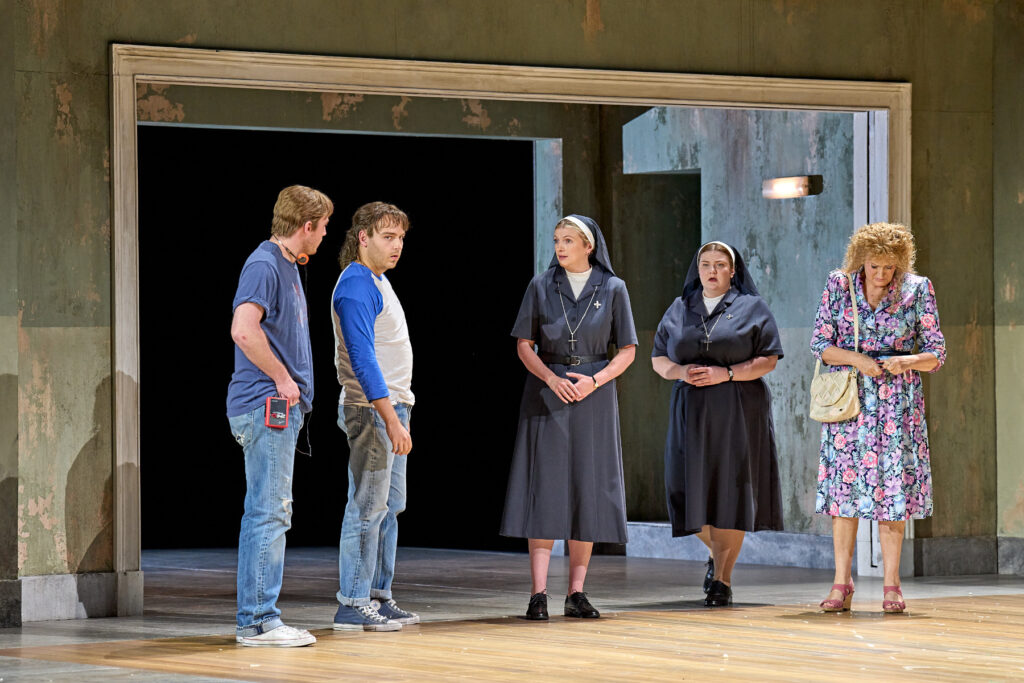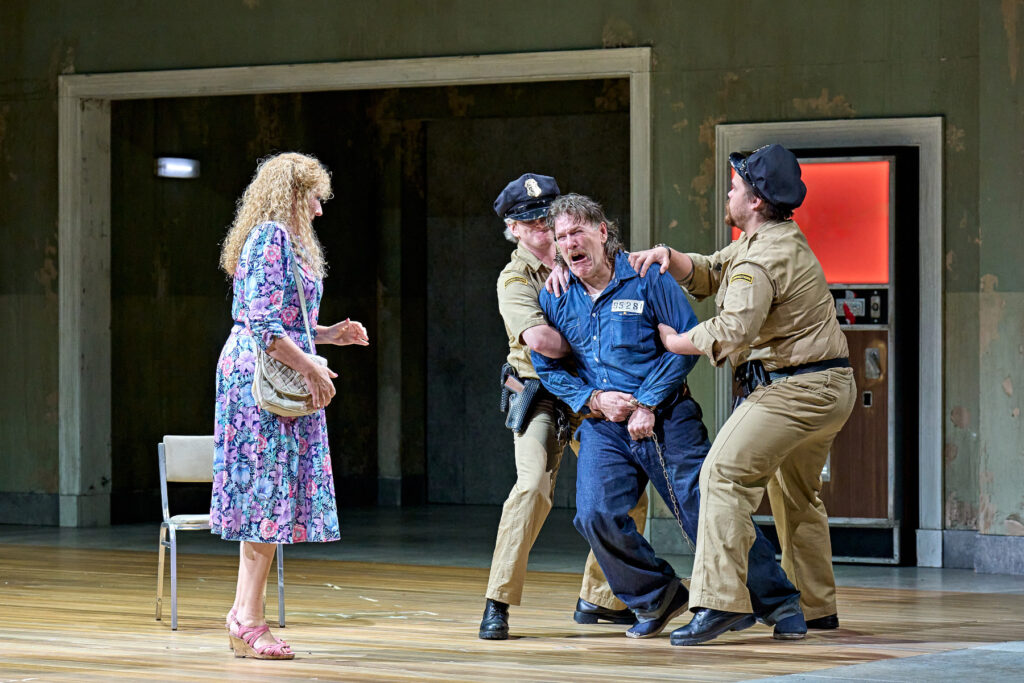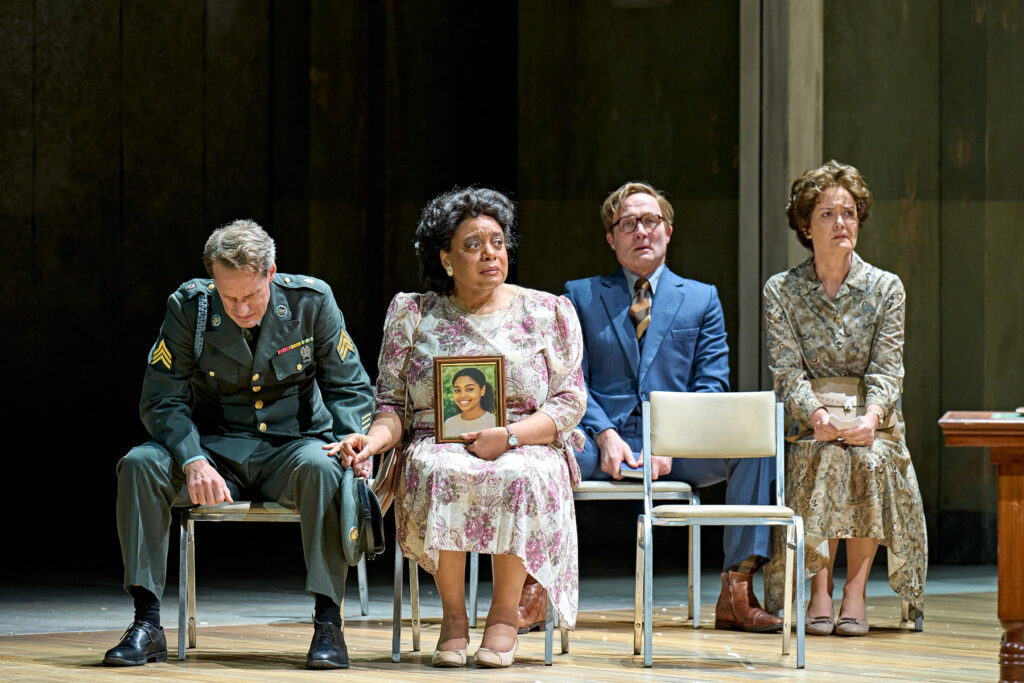“Judging others makes us blind, whereas love is illuminating”. This much-quoted line from Dietrich von Bonhoeffer (1906-1945) – a German Lutheran pastor, theologian and anti-Nazi dissident – could encapsulate the essence of Jake Heggie’s Dead Man Walking. Much of this opera is an examination of compassion, and asks how one forgives the unforgivable? Amongst the difficult questions Terence McNally poses is how society defends capital punishment. And for those left with the loss of a loved one, how can one merely “hate the crime but not the criminal”. The skill of McNally’s libretto is to challenge our sympathies and allow us to reach our own conclusions without dictating how we should think.
Dead Man Walking dramatises the events leading up to a convict’s death by lethal injection. Its plot is drawn from Sister Helen Prejean’s 1993 memoir of her encounter and developing relationship with a convicted murderer on death row – Joseph De Rocher – a character recreated from two felons known to her and which later generated a feature film and the composer’s adaptation commissioned by San Francisco Opera and premiered in 2000. With rape, murder and execution all uncompromisingly conveyed, it may seem surprising that it is now the most performed of all 21st-century operas. Equally remarkable, is that it has taken some 25 years for this co-production with Opera North and Finnish National Opera to reach English National Opera in this first fully staged version.

Dead Man Walking is bookended by death: first the rape and murder of two teenagers in their car at a lakeside pull in, lighting and music both hauntingly underpinning explicit detail, its graphic content forcing us to condemn its brutality without question. No less shocking is the closing scene where the condemned and now repentant prisoner De Rocher (Prisoner 95281) is being prepared for his last meal (Christian connotations here). His execution in the closing scene is witnessed by prison staff, the victims’ parents and Sister Helen. By this time our emotions have see-sawed, as we face the conundrum of an eye for an eye. That Sister Helen and Jake Heggie believe capital punishment is unacceptable is never forcibly argued yet provides much of the work’s expressive power.
Between these harrowing events, we meet the agony of the parents and their fury with Sister Helen in her determination to save De Rocher’s soul, rather than provide solace for an uncomprehending family, unable to come to terms with their loss. The notion of compassion is first introduced when a motorcycle cop catches and forgives Sister Helen speeding on her way to Louisiana’s state penitentiary. Earlier, the figure of a forgiving Jesus is implied in the gospel hymn sung at the Convent by the excellent Finchley Children’s Music Group coached by Sister Helen.

Alex Eales’s one-size-fits-all set cleverly suggests the nun’s convent (named Hope House), a court room and state prison, where within its windowless surroundings we meet an unsympathetic prison chaplain, a caring warden and an assortment of inmates. But if there’s an absence of warmth from the designs and presence of prison guards, it’s countered by the totally believable partnership between Christine Rice as Sister Helen and Michael Mayes as De Rocher, both so compelling one could almost be forgiven for thinking they were not acting. As the “angel of death”, Rice perfectly captures a nun struggling with her faith, bringing a dignity that belies her uncertainties. Sometimes stooped, or with a contemplative stillness, she fully inhabits the spirit of her role. As De Rocher, Michael Mayes (already a veteran soloist with this opera), delivers rage and misery (though only regret in the final moments), his baritone – like Rice’s mezzo – easily soaring over the orchestra. Amongst other notable performances, Sarah Connolly’s reminiscences of her son, De Rocher, tugs at the heart, her portrayal of naivety and pathos outstanding.
Elsewhere, Madeline Boreham is in fine fettle as Helen’s convent friend, Ronald Samm and Jacques Imbrailo impress as the smarmy chaplain and the tormented father of his murdered daughter respectively, while Zwakele Tschabalalap, as the motorcycle cop, is also highly credible. Ensemble numbers stand out too, notably a rendition of the Lord’s Prayer with its terrific climax on ‘heaven’. Annilese Miskommon’s staging is not without humour including De Rocher’s demand for his fellow convicts to “Show some respect, she’s a fucking nun!”, or the shared joy when Helen and De Rocher connect with an Elvis Presley song.

Supporting the whole is the composer’s eclectic score peppered with hymns and spirituals and a mélange of influences from Ives to Bernstein. It’s music that variously pulsates and comforts with its jazzy riffs and bluesy lyricism, where no idea outstays its welcome. Furthermore, Heggie’s movie-style pacing is superbly judged and played with evident aplomb by the ENO orchestra under Kerem Hasan’s galvanising baton. Altogether, a production not to be missed.
David Truslove
Dead Man Walking
Music: Jake Heggie
Libretto: Terence McNally based on a book by Sister Helen Prejean
Cast and Production:
Sister Helen Prejean – Christine Rice; Joseph De Rocher – Michael Mayes; Mrs Patrick De Rocher – Dame Sarah Connolly; Sister Rose – Madeline Boreham; Warden – George Benton; Father Grenville – Ronald Samm; Kitty Hart – Gweneth Ann Rand; Owen Hart – Jacques Imbrailo; Jade Boucher – Catherine Carby; Howard Boucher – Hubert Francis; Motorcycle Cop – Zwakele Tschabalalap; Older brother – Michael Laverty; Younger brother – Marcus Swietlicki; Sister Catherine – Olivia Rose Tringham; Sister Lilliane – Amy Hoyland,
Director – Annilese Miskimmon; Set Designer – Alex Eales; Costumes – Evie Gurney; Lighting – D.M. Wood; Movement – Imogen Knight & Brad Wendes; Conductor – Kerem Hasan
English National Opera; Coliseum. St Martin’s Lane, London Tuesday 4th November 2025
Top image: Malachy Frame, Michael Mayes, and Christine Rice
All photos © Manuel Harlan